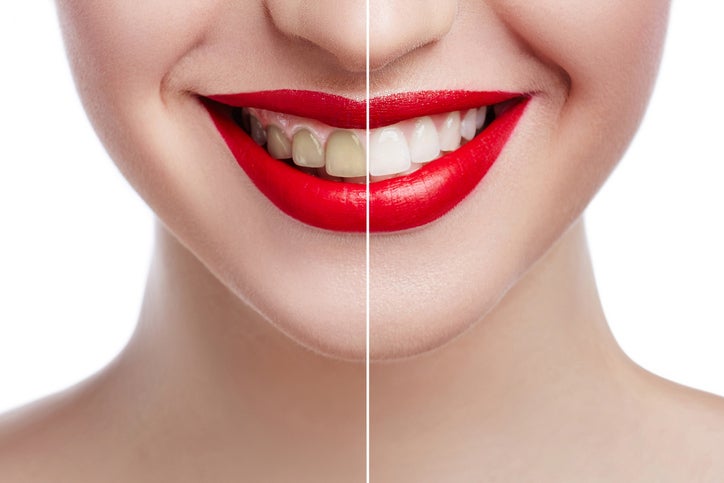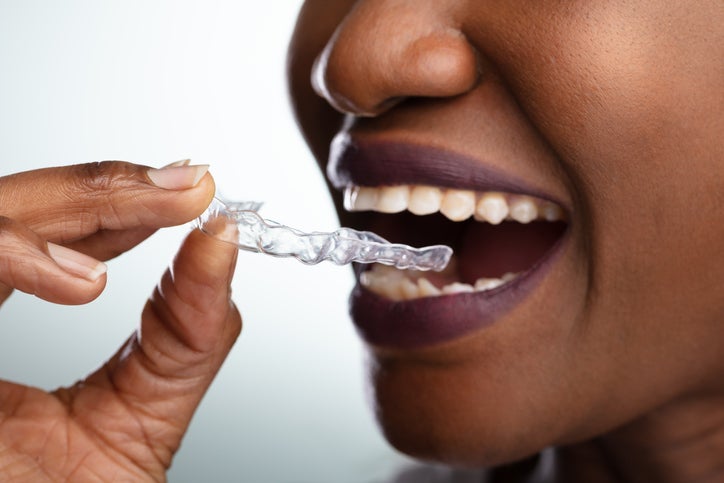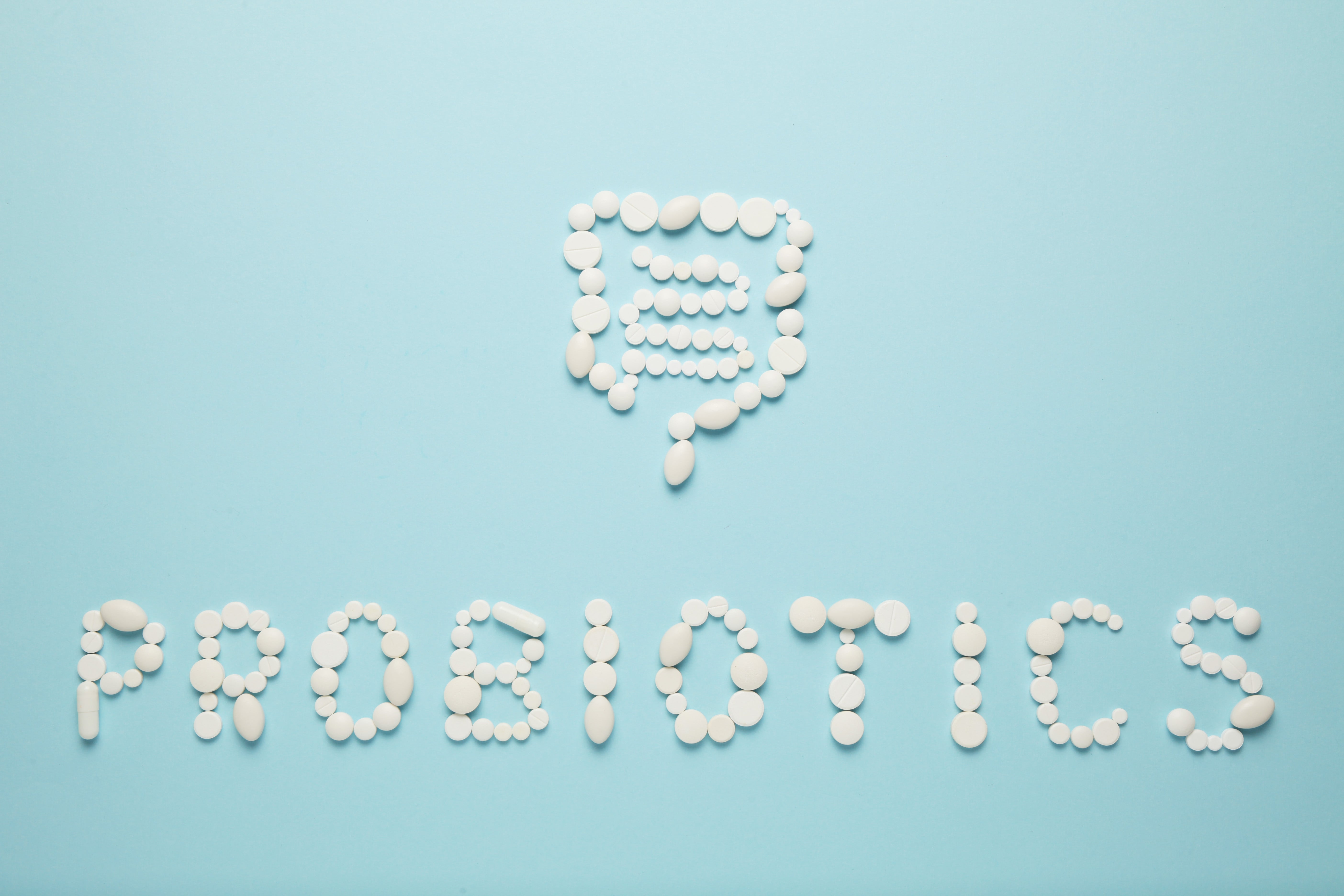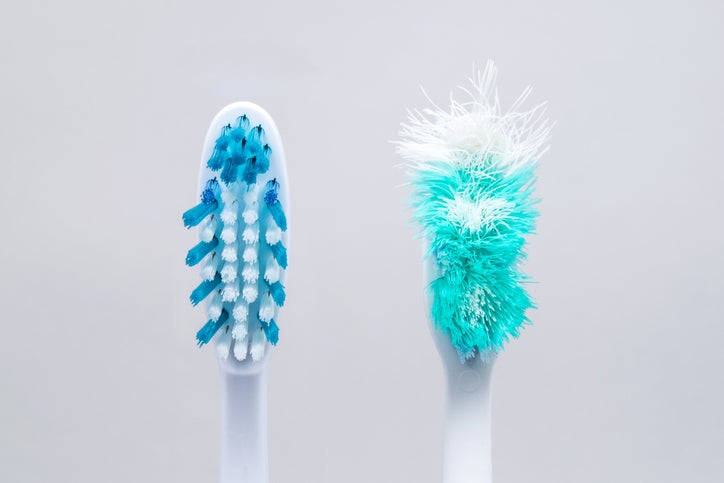-
Dental Veneers FAQs
Are you self-conscious about a chipped tooth or that gap in your smile? Stop hiding your mouth behind your hands, and restore your confidence with dental veneers! Here are the most frequently asked questions we hear about this type of cosmetic dentistry.

What are dental veneers?
Veneers are thin, strong pieces of tooth-colored porcelain that resemble an artificial fingernail. They are custom-made to fit your teeth using an impression or digital scan of your mouth. Veneers are bonded to the front of your teeth to improve their color, shape, size, and function.
How much do veneers cost?
The cost range depends on the dentist’s experience, the quality of the material used in making your veneers, and how many veneers you receive. Sometimes, insurance will cover the cost of one or two veneers when a fracture or decay is present.
How long do veneers last?
Thanks to the durability of porcelain and the strength of the bonding agent used to attach each veneer, you can expect the results to last decades. As long as the work is done right, the only time a patient should have problems with a veneer is after a traumatic event. Porcelain can crack, just like real teeth, but it takes a hard hit to the face or biting down on a bone to make it happen.
Are there any dietary restrictions?
It’s always wise to treat your teeth gently, whether you have veneers or not. This means avoiding using your teeth as tools and biting tough foods (like taffy, beef jerky, or French bread) with caution. Also, while veneers are stain-resistant, your dentist may recommend avoiding coffee, tea, red wine, and tobacco to help your beautiful new smile last.
What happens to the tooth under a veneer?
To ensure a natural appearance, about 0.5mm of your existing tooth must be shaved down in preparation for placing the veneer. There’s no need to damage the tooth structure aggressively to achieve authentic-looking results.
Will my teeth be immune to cavities?
Veneers can’t decay, but the natural tooth underneath can still get cavities. The most vulnerable spot is the junction between the veneer and your natural tooth. Sealing this area while placing the veneer closes it off to help prevent decay. Continue to brush and floss as usual to keep your teeth and gums healthy.
How many veneers should I get?
Eight is the most common number of veneers patients receive. With veneers on the four upper and lower teeth, a bright, white shade can be selected to make your smile look its best. If you get fewer veneers than this, the color must match your existing teeth to avoid standing out.
At Park 56 Dental, we help our patients look their best with dental veneers and other cosmetic dentistry. If you’re interested in learning more, please contact us at (212) 826-2322 to schedule a complimentary consultation. We serve Midtown, Central Park, Upper East Side, Park Avenue, and the surrounding Manhattan and NYC areas.
-
The Stages of Invisalign Treatment
Do you want straighter teeth without having a mouth full of brackets and wires? Invisalign could be right for you! This innovative technology gives you the smile you have always wanted in a discreet, comfortable way. Three simple steps are all that’s standing between you and the smile of your dreams.

Step 1: Plan Your Invisalign Treatment
Whether you have mildly crooked teeth or a severe bite problem, Invisalign may be an option for you. The first step is to visit a dentist for digital x-rays and a scan of your mouth. Powerful technology and your dentist’s expertise combine to create a digital roadmap of your path to a straighter smile.
Once your plans are finalized, you can sit down with your dentist and view your virtual treatment plan. You’ll see exactly what your bite looks like now and how it will gradually shift, with each successive aligner, until your smile is flawless. Most patients agree to a treatment plan lasting nine to 15 months.
Step 2: Wear Your Aligners
Invisalign aligners are made using an advanced printing process that ensures a comfortable, streamlined fit. Once they’re ready, you’ll need to schedule a time to pick them up at the dentist’s office. You’ll try them on, have any questions answered, and receive specific instructions for wearing your aligners.
Rest assured that Invisalign fits your life—it doesn’t interrupt it. You can keep eating all your favorite foods, play the sports you love, and brush and floss without pesky brackets and wires getting in the way. The removable aligners are easy to clean, and with proper care, they don’t increase your risk of tooth decay.
Most patients wear each pair of aligners for two weeks before moving onto the next set. For your Invisalign treatment to stay on track, you must wear your aligners for at least 22 hours a day. This leaves time to remove them for eating, but you should wear them at all other times.
To make sure your teeth are progressing the way they should, you should schedule periodic checkups with your dentist. This is also when you receive your next batch of aligners.
Step 3: Wear a Retainer
While your aligners are a crucial step for straightening your smile, a retainer is what makes the results last a lifetime. Vivera retainers are made with the same advanced technology as Invisalign, meaning they are custom to your mouth and less likely to crack than other clear retainers. You may only need to wear your Vivera retainers at night, so you can continue smiling with complete confidence during the day.
Park 56 Dental is a certified Invisalign provider in NYC. We can help you plan your smile transformation in our spa-like office, where you’ll receive patient-centered care during hours that fit your schedule. To learn more about Invisalign, please contact us online or call (212) 826-2322 and schedule a complimentary consultation. We serve Midtown, Central Park, Upper East Side, Park Avenue, and the surrounding Manhattan and NYC areas.
-
Can Probiotics Help Your Oral Health?
Probiotics are best known for promoting a healthy digestive system. However, that’s not all they can do. Here are some lesser-known facts about probiotics and how they can help your oral health.

What are Probiotics?
Probiotics are live bacteria and yeast that are beneficial to humans. They are found in certain foods and can also be taken as supplements. Examples of probiotics include:
- Lactobacillus, which helps with diarrhea and makes lactose easier to digest
- Bifidobacterium, which helps with irritable bowel syndrome (IBS) and other inflammatory digestive conditions
- Saccharomyces boulardii, which helps combat digestive issues that cause diarrhea
How Probiotics Work
Bacteria are generally considered harmful. However, your body is full of bacteria, both good and bad. If you have digestive issues caused by too many bad bacteria, probiotics can help balance things out. Likewise, when you lose beneficial bacteria, such as from taking antibiotics, probiotics can help replace them.
Health Benefits of Probiotics
The main reason people take probiotics is to promote a healthier gut, but good bacteria can improve your health in many other ways as well. Research shows that probiotics help treat:
- Skin conditions, including eczema
- Mental health
- High cholesterol and hypertension
- Allergies and colds
- Bad breath, gum inflammation, and oral cancer
Products that Contain Probiotics
In general, foods that have been fermented or enriched in some way contain probiotics. These include:
- Yogurt
- Milk
- Soft cheese
- Miso (fermented soybeans)
- Sauerkraut
- Sourdough bread
Probiotic supplements are also available in the form of tablets, capsules, and powders. Some oral health products, including mouthwash and toothpaste, also contain probiotics.
Precautions & Side Effects
It’s safe for most people to take probiotics because these good bacteria and yeasts are already in your body. A majority of the time, probiotics improve health with little to no adverse reactions. However, some side effects are possible:
- An upset stomach may occur within the first few days of taking probiotics.
- People who are allergic to probiotics may have a more severe digestive response.
If you have a weakened or compromised immune system, you should not take probiotics because they could trigger an infection. Don’t take probiotics while you are seriously ill or recovering from surgery.
Using Probiotics to Help Your Oral Health
It’s wise to consult with a dentist before taking probiotics for oral health. The types of products available include probiotic toothpaste, which rids your mouth of bad bacteria while leaving good bacteria intact, and probiotic mouthwash, which helps prevent plaque buildup. Just remember, probiotics are not meant to replace other good oral health habits, including brushing, flossing, eating a healthy diet, and having your teeth professionally cleaned twice a year.
Looking for a qualified dentist in New York? Park 56 Dental can meet your needs in our spa-like office. We serve Midtown, Central Park, Upper East Side, Park Avenue, and the surrounding Manhattan and NYC areas. Contact us at (212) 826-2322 to schedule your complimentary consultation today.
-
How Often to Replace Your Toothbrush
You might brush your teeth twice a day, but how closely do you look at the bristles before sticking them in your mouth? Get the most out of your oral care routine by taking care of your toothbrush and replacing it as needed.

When to Replace Your Toothbrush
The American Dental Association (ADA) recommends changing your toothbrush every three months. This is about how long it takes for the bristles to become frayed. When this happens, your toothbrush loses the ability to scrub your teeth and remove plaque effectively, making you more vulnerable to cavities and gum disease.
It’s also possible for germs to build up within the bristles. That’s why you should also replace your toothbrush after being sick. Continuing to use the same one could make you sick again. For this reason, it’s wise to have a backup toothbrush or two in your medicine cabinet.
Take Care of Your Toothbrush
You must clean and store your toothbrush properly to keep fungus and bacteria at bay. Start by rinsing it thoroughly after each use to remove all traces of saliva and toothpaste.
Then, store the toothbrush upright and uncovered so it dries quickly. Choose a location as far away from the toilet as possible to prevent fecal matter from settling on the bristles. Don’t share your toothbrush with anyone, and keep each family member’s toothbrush separate from one another so the bristles don’t touch and spread germs.
Only cover your toothbrush while traveling to prevent it from touching unsavory surfaces. Even then, only pack your toothbrush in a travel case when it’s completely dry.
If you’re concerned about germs, you can use a toothbrush sanitizer. This kills bacteria using steam and dry heat or UV light. While these methods aren’t enough to sterilize your toothbrush, they remove enough oral bacteria to sanitize or disinfect the bristles.
How to Shop for a New Toothbrush
If you realize it’s been more than three months since you replaced your toothbrush, it’s time to go shopping. The most important qualities to look for in a new toothbrush are soft bristles and a small head to get in hard-to-reach places. Other characteristics—including the handle type, head shape, and bristle features—come down to personal preference.
You might also consider investing in an electric toothbrush. The incredibly fast-moving bristles are shown to remove 21 percent more plaque and reduce the risk of gingivitis by 11 percent. Powered toothbrushes are easier for children and people with arthritis to operate. They also have removable heads, which you should replace every three months like an ordinary toothbrush.
If you’re unsure about how to care for your toothbrush or what products you should include in your oral care routine, ask your dentist for recommendations. Your professional cleaning twice a year is a great time to find out more about maintaining a beautiful smile. To schedule a complimentary consultation at Park 56 Dental, please contact our NYC dentist office at (212) 826-2322 today.
RECENT POSTS
categories
- Uncategorized
- Cosmetic Dentistry
- Veneers
- Healthier Teeth
- Teeth Whitening
- Dental Health
- Video
- Dental Emergencies
- Invisalign
- Dental Implants
- Root Canal
- Sedation Dentistry
- Infographic
- Dental Crowns and Bridges
- Dental Anxiety
- Gum Disease
- COVID-19
- Bad Breath
- New York Dentist
- Cut out sugar
- General Dentistry
- Oral Health
- Oral Cancer
- Dry Mouth
- Gum Health
- Toothache
- Dental Sealants
- Cavities
